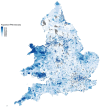Prepayment meters strongly associated with multiple types of deprivation and emergency respiratory hospital admissions: an observational, cross-sectional study
- PMID: 37857480
- PMCID: PMC10715545
- DOI: 10.1136/jech-2023-220793
Prepayment meters strongly associated with multiple types of deprivation and emergency respiratory hospital admissions: an observational, cross-sectional study
Erratum in
-
Correction: Prepayment meters strongly associated with multiple types of deprivation and emergency respiratory hospital admissions: an observational, cross-sectional study.J Epidemiol Community Health. 2024 Mar 8;78(4):271. doi: 10.1136/jech-2023-220793corr1. J Epidemiol Community Health. 2024. PMID: 38458624 Free PMC article. No abstract available.
Abstract
Background: Prepayment meters (PPMs) require energy to be paid in advance. Action groups and media contend that PPMs are concentrated in the most vulnerable groups, prone to run out of credit and experience financial burden. This led to forced installation for those over age 85 being banned in April 2023 and a 'prepayment premium' scrapped in July 2023. Yet, we lack empirical evidence of which groups PPMs are concentrated. This ecological study examines the extent to which PPMs are associated with multiple measures of structural social, economic and health deprivation to establish evidence-based policy.
Methods: Combining multiple regional data and census estimates at the Lower Layer Super Output Area and the Middle Layer Super Output Area level from England and Wales, we use Spearman's rank correlation, Pearson correlation and multivariate linear regression to empirically establish associations between PPMs and multiple types of deprivation.
Results: Higher PPM prevalence is strongly associated with: lower income, receipt of employment benefits, ethnic minorities, lower education and higher health deprivation. Higher PPM prevalence is strongly associated with higher income deprivation affecting children, the elderly and social rental properties. PPMs are significantly associated with emergency hospital admissions for respiratory diseases in England, even after controlling for confounders (coefficient=1.81; 95% CI 1.51 to 2.11).
Conclusions: We found empirical evidence that PPM users are concentrated among the population who already experience multiple disadvantages. Furthermore, PPM concentrated areas are associated with higher emergency hospital admissions for respiratory diseases.
Keywords: deprivation; health inequalities; policy; public health; social sciences.
© Author(s) (or their employer(s)) 2024. Re-use permitted under CC BY-NC. No commercial re-use. See rights and permissions. Published by BMJ.
Conflict of interest statement
Competing interests: None declared.
Figures




References
-
- Citizens Advice . Millions left in the cold and dark as someone on a prepayment meter cut off every 10 seconds, reveals citizens advice. 2023. Available: https://www.citizensadvice.org.uk/about-us/about-us1/media/press-release... [Accessed 25 Apr 2023].
-
- Sky News . Forced installation of prepayment energy meters banned for over 85S under new Ofgem code of practice. 2023. Available: https://news.sky.com/story/forced-installation-of-prepayment-meters-bann...
-
- GOV.UK . Prepayment meter customers to pay less for energy from today. 2023. Available: https://www.gov.uk/government/news/prepayment-meter-customers-to-pay-les... [Accessed 6 Jul 2023].
-
- Ferriani F, Gazzani AG. The impact of the war in Ukraine on energy prices: consequences for firms’ financial performance. SSRN Journal 2023. 10.2139/ssrn.4216406 - DOI
-
- Casciani D, Collinson A. Prepayment meters: magistrates told to stop allowing forced installations. BBC news. Available: https://www.bbc.co.uk/news/business-64542229 [Accessed Apr 2023].
Publication types
MeSH terms
LinkOut - more resources
Full Text Sources
Miscellaneous
